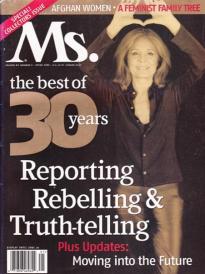Starting point: Burgeoning consciousness about feminism, but lack of central organizing point to address and communicate challenges
Organizing strategy: An external and internal face for feminism
Tools: A national magazine
Outcomes: An intellectual center for a strong movement that has changed the world
Primary Resources: http://msmagazine.com/
When Ms. was launched as a “one-shot” sample insert in New York Magazine in December 1971, few realized it would become the landmark institution in both women’s rights and American journalism that it is today.
The founders of Ms., many of whom are now household names, helped to shape contemporary feminism. According to founding editor Letty Cottin Pogrebin, Ms.’ authors translated “a movement into a magazine.”
Ms. was a brazen act of independence in the 1970s. At the time, the fledgling feminist movement was either denigrated or dismissed in the mainstream media — if it was mentioned at all. Most magazines for women were limited to advice about saving marriages, raising babies, or using the right cosmetics.
When the Ms. preview debuted-carrying articles on subjects such as the housewife’s moment of truth, “de-sexing” the English language, and abortion, the syndicated columnist James J. Kilpatrick jeered that it was a “C-sharp on an un-tuned piano,” a note “of petulance, of bitchiness, or nervous fingernails screeching across a blackboard.”
And after the first regular issue hit the newsstands in July 1972, the network news anchor Harry Reasoner challenged, “I’ll give it six months before they run out of things to say.”
But Ms. struck a chord with women. Its 300,000 “one-shot” test copies sold out nationwide in eight days. It generated an astonishing 26,000 subscription orders and over 20,000 reader letters within weeks. By the time Ms. celebrated its 15th anniversary in 1987, Reasoner, media soothsayers, and the nation had all been pressed to change their tune.
Ms. was the first U.S. magazine to feature prominent American women demanding the repeal of laws that criminalized abortion, the first to explain and advocate for the ERA, to rate presidential candidates on women’s issues, to put domestic violence and sexual harassment on the cover of a women’s magazine, to feature feminist protest of pornography, to commission and feature a national study on date rape, and to blow the whistle on the undue influence of advertising on magazine journalism.
Ms. was the first national magazine to make feminist voices audible, feminist journalism tenable, and a feminist worldview available to the public.
Today, the magazine remains an interactive enterprise in which an unusually diverse readership is simultaneously engaged with each other and the world. The modern Ms. boasts the most extensive coverage of international women’s issues of any magazine available in the United States. And the magazine’s time-honored traditions-an emphasis on in-depth investigative reporting and feminist political analysis, the Ms. Women of the Year Awards, and the renowned “No Comment” section-have been supplemented with discussion of such subjects as environmental feminism, women’s work styles, and the politics of emerging technologies, bringing a new generation of writers and readers together to create the feminism of the future.
Unique, outspoken, and hard-hitting, Ms. has consistently faced down financial instability and advertiser resistance. From 1978 to 1987, Ms. was published as a nonprofit magazine through the Ms. Foundation for Education and Communication. In the ensuing decade and a half, Ms. had four different owners and adopted a revolutionary and extremely popular advertising-free model.
On Dec. 31, 2001, the Feminist Majority Foundation, run by president Eleanor Smeal, assumed ownership of Ms. through Liberty Media for Women, LLC. A consortium of feminists — including Marcia Gillespie and Gloria Steinem, as well as businesswomen, students, philanthropist, and activists — had been publishing Ms. under Liberty Media since 1998. Gillespie and Ms. co-founder Gloria Steinem were thrilled with the partnership.
“This is the perfect marriage of information and action,” said Gillespie. “I cannot imagine a better gift for Ms. readers than a future strengthened by synergy with the Feminist Majority Foundation and the leadership of Ellie Smeal.” Ms. operations are now located in the offices of the Feminist Majority Foundation in Los Angeles and Arlington, Va., but the change of venue has not changed the scope and depth of information that Ms. has always delivered. Ms. continues to be an award-winning magazine recognized nationally and internationally as the media expert on issues relating to women’s status, women’s rights, and women’s points of view.



